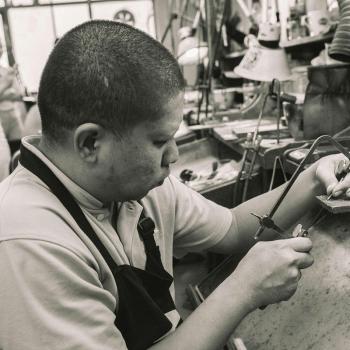What happens when you pull the emergency brake on the freeway? A client decided to try it at 60mph. It was his way of crying for help. Sometimes a person’s bad behavior can speak louder than their words.

Recently, I met a client upon his release from jail. I didn’t have all the details about his weekend incarceration. So, I asked questions to learn why he’d been arrested. As I drove him to an appointment, we turned onto the freeway, going 60 mph in moderate traffic. He related the story of his arrest, but some of the details eluded me. So, I asked what I believed to be good, clarifying questions.
Emergency Brakes at Highway Speeds
Without warning, he reached from the passenger seat and pulled the handle to the parking brake. The car lurched as we decelerated rapidly. The driver behind us hit the horn, squealed their tires, and swerved to avoid rear-ending us. Fortunately, we avoided collision by a narrow margin. I reached down, releasing the parking brake, and pulled to the shoulder as soon as possible. “Why did you do that?” I asked him.
“I just want everything to stop,” he said. “I want all the problems to stop. I want all the questions to stop.”
“Stop the World”
Suddenly I realized my client had communicated his desire to stop, or rather for me to stop, in the only way he knew how in that moment. Pulling the parking brake was his way of saying, “Stop the world, I want to get off.” Throughout the rest of our encounter that day, I could collaborate with him under a new understanding.
At that moment, all this man wanted was to have his needs met. He didn’t need to explain himself to me or anyone else. He didn’t feel like defending behaviors that led to his incarceration. All he required at that moment was for someone to care for him. He needed me to listen to what he wanted to say, instead of asking questions.
The Questions Weren’t the Problem
The questions themselves weren’t the problem. I’ve been trained in Motivational Interviewing, so my queries were good ones, intended to draw him out. The problem wasn’t the substance of my inquiries—but the fact that I was asking questions at all.
When I pulled to the freeway shoulder, I talked with him about not endangering our lives and those around us. But I did so without judgment. I realized that no matter how much of a reflex pulling the brake had been, it was the only way he knew to communicate his desire to make everything stop.
With my eyes on the road, I had missed my client’s nonverbal cues. I didn’t see his crossed arms, hunched shoulders, darting eyes, and other indications that he didn’t want to talk. Unaware of these clues, I persisted in my questions. From my perspective, I was being engaging and inquisitive. But he felt like he was getting grilled. Frustrated by my persistence, he halted the conversation in a way I couldn’t misunderstand.
Cries for Help and Positive Attention
Usually, when people behave badly, we judge them for it. We label them as dangerous, as crazy, or as criminals. In reality, they are crying out to be heard, the only way they know how. Too often we follow our own agendas as we interact with others. We get distracted by our surroundings, paying half attention to what others desperately try to convey. Then, when they behave badly, we judge and label them without realizing that their extreme behavior is an effort to get our attention. Emergency brakes at highway speeds are cries for help and positive attention, spoken in a language of desperation.
Misbehavior as the Voice of the Oppressed
At the height of the George Floyd protests in 2020, many people judged and labeled protesters. When they damaged property, “upstanding citizens” called them criminals. Yet, had American society taken the time to listen, we would have realized that rioting was their way pulling the emergency brake at 60 miles per hour (100kph). It was something they would not have needed to do had the culture listened in the first place.
In his 1968 speech, “The Other America,” Dr. Martin Luther King Jr. addressed this tendency toward misbehavior as the voice of the oppressed. He said,
“…A riot is the language of the unheard. And what is it America has failed to hear? It has failed to hear that the plight of the negro poor has worsened over the last twelve or fifteen years. It has failed to hear that the promises of freedom and justice have not been met. And it has failed to hear that large segments of white society are more concerned about tranquility and the status quo than about justice and humanity.”
Dr. King’s wisdom applies not just to people of color, but to all whom society marginalizes. For my client, race and ethnicity were not the issue. Instead, mental health challenges, substance use, and homelessness caused him to act in antisocial ways that led to his arrest. When the system that should have helped him instead incarcerated him, he could think of no other way to express his frustration than pulling the e-brake. “I just want it to stop,” he said, in the only way he knew how.
What Are They Trying to Communicate?
The next time someone misbehaves around you, instead of judging and labeling them, ask yourself, “What are they trying to communicate?” They have been crying out to you all along. Perhaps, like me, you’ve been trying to have a conversation while distracted. Chances are you’ve created a situation in which their misbehavior is the only language that will get your attention. If that’s the case, it’s likely they won’t behave better until you listen better.













